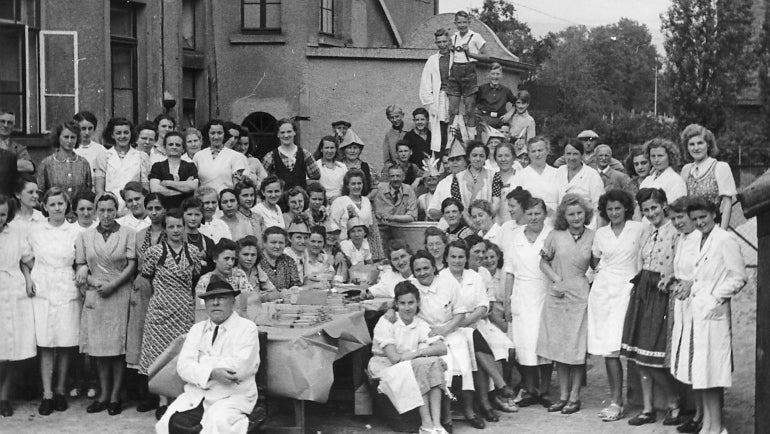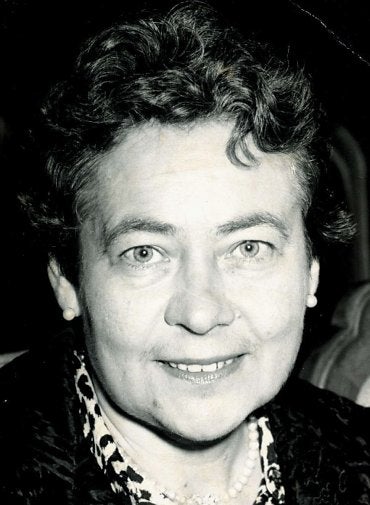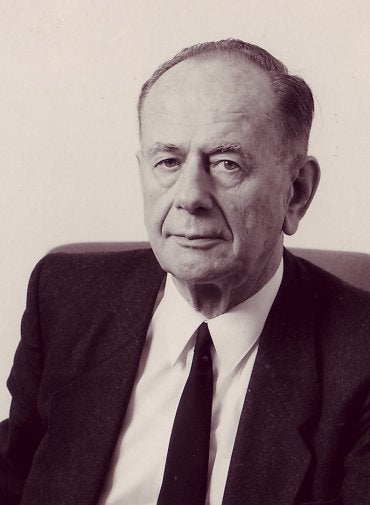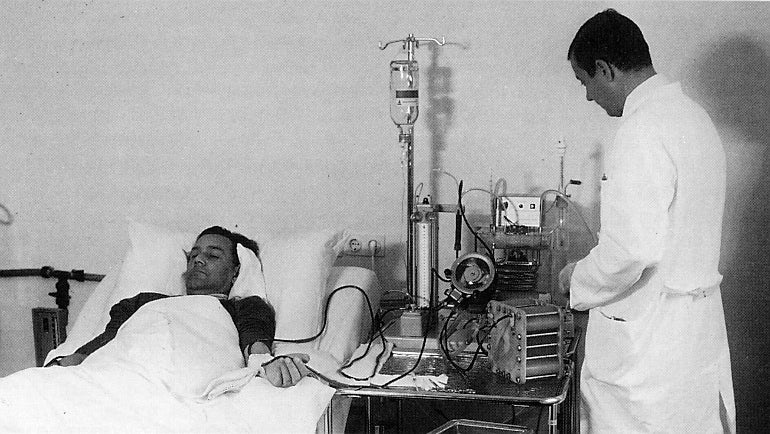
A car rattles as it turns the corner. It pushes and weaves its way through the streets of downtown Frankfurt – passing bicycles, pedestrians and horse-drawn carriages. The year is 1912. The car belongs to the Hirsch Pharmacy, one of the oldest apothecaries in the city. And the pharmacy head is Dr. Eduard Fresenius.
Stored in the trunk of the car are various preparations for treatment of skin conditions and colds, as well as sterile solutions for injection. The driver is on his way to sanitariums located on the outskirts of Frankfurt. He makes regular deliveries of Hirsch Pharmacy products to the spas. Pedestrians watch as the car goes by. This is an age when traffic on the streets is characterized by horse-drawn conveyances and bicycles – the car draws attention. Nevertheless Eduard Fresenius invests in the new technology as soon as he takes over the pharmacy from this father. Speedy delivery of pharmaceuticals to patients is a priority for him.
The Hirsch Pharmacy has a long tradition: Its history can be traced back to the 15th Century. The Fresenius family becomes the owners in the 1870s. When Eduard Fresenius takes charge, he has big plans. In 1912 he founds “Dr. Eduard Fresenius chemisch-pharmazeutische Industrie,” in a back room of the pharmaceutical wholesaler. This lays the foundation for today’s healthcare group. A modest pharmaceutical company is born out of the pharmacy laboratory.
Solutions made from the purest distilled water are a specialty of Eduard Fresenius. The quick success of the company also is due to the numerous collaborations that Eduard Fresenius enters into with well known physicians. For Nobel Prize winner Paul Ehrlich, Fresenius develops the “Injectio Fresenius” solvent used in his syphilis cure. Under the name Ampuwa, an abbreviation for ampule water, the solvent to this day is part of the Fresenius inventory."A pharmacy today? we need to expand it or add something new to it." (Dr. Eduard Fresenius)
Eduard Fresenius runs the pharmacy in Frankfurt until 1934, when he relocates company headquarters to Bad Homburg. The company founder is full of ideas on how to gain recognition for his company. Often he is ahead of his time with these ideas. Early in the 1930s he begins distributing a Hirsch Pharmacy magazine for customers. A few years later he opens a diet pavilion in Bad Homburg. During summer months guests consume fresh fruit and vegetable juices. Fresenius employees also prepare special drinks for diet patients based on doctors’ prescriptions. Particularly popular were the milk mix drinks, an early form of the milkshake.
Realizing great ideas is expensive. In financial matters, Eduard Fresenius is unlucky. And the years to come are challenging ones for the businessman. During the Second World War he loses contact with a lot of important business partners. He does not join the Nazi party. Supplying the German army with medications like the Freka frostbite cream helps for a time to maintain company production.
The end of the war finds Eduard Fresenius standing before the rubble that was his existence: Allied bombs have completely destroyed the Hirsch Pharmacy. Raw material shortages make production in Bad Homburg impossible. In the midst of reorganizing the company, Dr. Fresenius dies suddenly in 1946. He names his foster daughter, Else Kröner, née Fernau, as benefactor of his estate.
Just 26 years old, she inherits the Hirsch Pharmacy and the leadership of the company. As a newly licensed pharmacist, Else Kröner knows her way around pharmaceutics, but when it comes to business management she soon reaches her limits. She obtains the needed skills by attending evening classes at a private business school in Frankfurt. She spends nearly 12 hours a day in the company and doggedly works to rebuild the firm during difficult years. Her efforts earn her a great deal of respect and admiration among the staff. She eventually turns over running the Hirsch Pharmacy to a fellow pharmacist. Her main focus now is running the company in Bad Homburg. With a lot of effort, she and her eventual husband, Hans Kröner, develop Fresenius over the following years into a global healthcare group.
Else and Hans Kröner realize they can only keep the company going if they succeed in growing with new ideas. With their employees, they begin searching for new horizons – and soon find one. Since the early days, the expertise of the company has been infusion solutions. Over the next years Fresenius continuously expands its product range, developing new nutrition- and volume replacement solutions such as Generika, which are administered by infusion. The company does more than develop its solutions, it also improves their packaging. Into the 1960s infusion solutions are still stored in glass bottles. Fresenius succeeds in developing special plastic bags and bottles. These are easy to handle, and break proof plastic containers become an immediate market success.
As a medium-sized company producing solutions for dialysis, Fresenius first comes into contact with dialyzers in the 1960s. Dialyzers are blood filters used during a dialysis treatment of patients with chronic kidney failure to purify their blood. This treatment is life saving for kidney patients – but at the time it is very laborious and expensive. Only a few patients can be treated. Through media reports, Fresenius learns of the desperate situation facing many kidney patients, and begins to import American dialysis machines. As they maintain the machines, Fresenius workers gain technical know-how. In the 1970s the company develops its first dialysis machines in a newly acquired plant in Schweinfurt. Constant advancements in materials and technology over the next years enable the company to continue improving dialysis treatment for kidney patients. Fresenius in the 1980s succeeds in developing a capillary made from polysulfone that purifies blood almost as efficiently as a human kidney. To this day blood filters made from this material are the standard in dialysis.
Numerous strategic acquisitions are a hallmark of the next years: 1996 brings the merger of the Fresenius dialysis unit with American dialysis provider National Medical Care to form a new division, Fresenius Medical Care. As a result Fresenius becomes one of the world’s largest providers of dialysis services. In the same year, Fresenius acquires a majority stake in the hospital services provider VAMED AG. Originally founded to plan and build the Vienna General Hospital, VAMED becomes a new business leg for the healthcare group. Acquisition in 1999 of the international infusion business of Pharmacia & Upjohn leads to creation of the business unit Fresenius Kabi.
There are more acquisitions around the world, through which the company also enters the US pharmaceuticals market and assumes a leading role in the global market for generic IV drugs. In 2005, Fresenius takes over the private hospital chain HELIOS Kliniken GmbH and fuses it with Wittgensteiner Kliniken, which it acquired in 2001. This creates the Fresenius Helios division. Fresenius Helios in 2013 acquires 41 hospitals from Rhön-Kliniken, making it the largest hospital operator in Germany.
Hardly any European company in past years has been able to match the dynamic growth of Fresenius. Currently more than 300,000 employees around the world work for the healthcare group. What began as a small pharmacy laboratory is today a leading global healthcare group with a presence in more than 80 countries. The small family operation that Dr. Eduard Fresenius led until his death is different from today’s company in many respects. However the fundamental values of our company are unchanged. To preserve lives and improve the quality of life for sick people has been our motivation for more than 100 years. “Forward thinking healthcare,” symbolizes what we want in the future: constant improvements in medicine for more and more people.
100 Years of Fresenius











